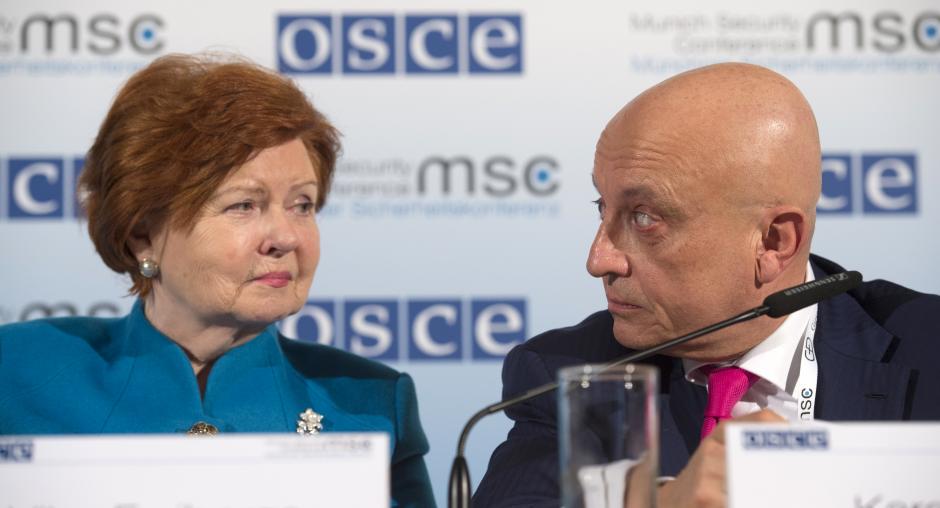Work of the Panel of Eminent Persons discussed at the 52nd Munich Security Conference

The final recommendations of the Panel of Eminent Persons on European Security as a Common Project were discussed on 14 February 2016 on the margins of the 52nd Munich Security Conference, with Panel members joined by over 60 journalists and Conference participants to discuss perspectives for reconsolidating European security.
The event was opened by Wolfgang Ischinger, Chair of both the Munich Security Conference and the Panel of Eminent Persons, who briefly presented the Panel’s work. He underlined that despite divergent views on certain issues there was a general agreement among all Panel members on a sense of urgency about a lack of security in Europe.
“We do not need to reinvent rules or institutions but we need to make them work better in today’s rapidly deteriorating security environment,” Ischinger said. He added that an absolute majority of the Panel had agreed that the full implementation of the Minsk Agreements with regard to the crisis in and around Ukraine is a necessary precondition for any serious diplomatic effort toward rebuilding trust and confidence in Europe.
Gernot Erler, Special Representative of the Federal Government of Germany for the OSCE Chairmanship, stressed that “the Panel’s final report confirmed that now, perhaps more than ever, we need to uphold the vision of Helsinki, the vision of a Europe based on trust and co-operation.”
He noted that the Panel had launched an innovative dialogue process and that its forward-looking reports correlated with the leitmotif of Germany’s 2016 OSCE Chairmanship: Renewing dialogue, rebuilding trust, restoring security. He said that Chairmanship will offer further opportunities for facilitating dialogue on many levels in the coming months.
OSCE Secretary General Lamberto Zannier noted that a lack of trust and dialogue was leading to “too many monologues but not enough dialogue.”
“The OSCE is perhaps a bit different from other international organizations in that we respect and openly recognize the existence of divergent perspectives. While accepting these differences, we try to build bridges and find common solutions to the challenges we all face. What we are doing in Ukraine is also very much about that,” said Zannier, noting that efforts at the inter-governmental level should be complemented by dialogue between official and non-official actors, among other things.
Vaira Vike-Freiberga, former President of Latvia, expressed hope that OSCE participating States will take up the Panel’s recommendations and return to a diplomacy that strives to see common interests beyond divergent opinions, views and perspectives.
Sergey Karaganov of the Russian Federation, Dean of the School of International Economics and Foreign Affairs of the National Research University Higher School of Economics, said that although he disagrees with many of the report’s recommendations, he considers the exercise to have been important since for the first time in many years, all sides spoke openly about their differences and listened to each other.
Sergi Kapanadze, Director of the think tank Georgia’s Reform Associates, highlighted the security status of what is described in the Panel’s final report as the “states in-between” – it is here that diplomatic efforts should be concentrated most, he said.
The independent Panel of Eminent Persons on European Security as a Common Project was mandated by the OSCE Troika (Germany, Serbia, Switzerland) and launched at the 21st OSCE Ministerial Council in Basel in December 2014. Its final report, Back to Diplomacy, was presented at the 22nd OSCE Ministerial Council in Belgrade in December 2015. The interim report, Lessons Learned for the OSCE from its Engagement in Ukraine, was published in June 2015.
In line with the Panel’s mandate, several other outreach events will take place in the first half of 2016.
